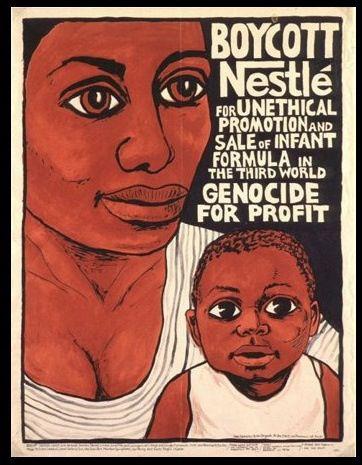
Third World export
of baby milk
Breastfeeding (Natural immunisation)
& Bottlefeeding
Food Inc
[Covert way to kill of third world children. With the one hand they create more babies by bottle feeding which doesn't suppress fertility like breastfeeding, they then promote death with dirty water through bottle feeding. Child sacrifice for profit.]
One baby lived. The other died
McSpotlight on the Baby Milk Industry
Baby Milk Action

Quotes
"I saw mother after mother in the paediatric wards, head in hands, crying beside
the cribs where their babies lay, malnourished, dehydrated, sick from Bottle Baby Disease.
It doesn't need to happen. A decade ago we knew the truth about irresponsible marketing of
infant formula. Allowing the companies to continue these practices is an inexcusable
outrage of humanity, if not outright criminality." Janice Mantell, Action for
Corporate Accountability (USA) http://www.mcspotlight.org/beyond/nestle.html
Both late menarche and breastfeeding contributed significantly to child spacing in pre-industrial Europe and still does in the developing world, for breastfeeding prevents more births worldwide than all other forms of contraception put together.......the west's export and promotion of artificial baby foods, together with the grosser errors in infant feeding techniques disseminated by health workers, have had a serious effect on birth spacing, which is a key factor in both demographic trends and in the well-being of individual women. This method of fertility control had been recognised since ancient times, but its importance was forgotten and ignored during the last two centuries because the changes in social organisation and in breastfeeding practices damaged its effectiveness. A seventeenth-century working Englishwoman married late and had well-spaced pregnancies. She used breastfeeding both to supplement her living and to space and limit her own childbearing. As unrestricted breastfeeding was the normal practice in those days she would have been unlikely to ovulate. Wealthy women were discouraged from feeding their own babies in order to reproduce greater numbers of the nobility. Slaves had their breastfeeding time limited so that they could breed more slaves for their owners. Yet by the twentieth century in Europe the use of lactation as a means of child spacing was not discussed or considered by doctors or advocates of birth control. The Politics of Breastfeeding by Gabrielle Palmer
Most women who are breastfeeding do not menstruate and for thousands of years many have known that there is a connection between the resumption of menstruation and fertility. Certain groups actually shortened the period of breastfeeding so as to increase their birth rate. There has not been a great deal of communication between ordinary women (who may be reticent about discussing their bodies' functions) and researchers who until recently had mostly been men. Consequently this 'old wives' tale' was disregarded for many years.The Politics of Breastfeeding by Gabrielle Palmer